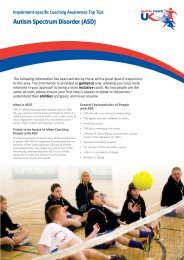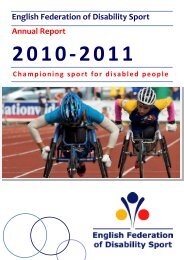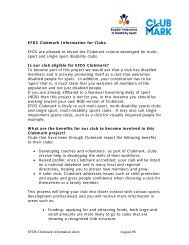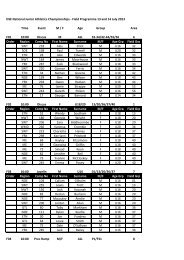OO213 - English Federation of Disability Sport
OO213 - English Federation of Disability Sport
OO213 - English Federation of Disability Sport
- No tags were found...
Create successful ePaper yourself
Turn your PDF publications into a flip-book with our unique Google optimized e-Paper software.
are particularly important. Developmentalscreening is an effective means <strong>of</strong> detecting disabilityin children. 56 It can take place in primaryhealth-caresettings, for example, during immunizationvisits or growth monitoring check-upsat community health centres. The purpose <strong>of</strong>screening is to identify children at risk, to referthem for further assessment and interventionas needed, and to provide family members withvital information on disability. Screening involvesvision and hearing examinations as well asassessments <strong>of</strong> children’s progress against suchdevelopmental milestones as sitting, standing,crawling, walking, talking or handling objects.Health-care systems in high-income countriesprovide numerous opportunities to identify andmanage developmental difficulties early in achild’s life. But interventions to improve youngchildren’s development are becoming increasinglyavailable in low- and middle-income countries.These include such interventions as treating irondeficiency, training caregivers and providingcommunity-based rehabilitation. 57Recent studies in high- and low-income countrieshave shown that up to 70 per cent <strong>of</strong> childrenand adults newly diagnosed with epilepsycan be successfully treated (i.e., their seizurescompletely controlled) with anti-epileptic drugs.After two to five years <strong>of</strong> successful treatment,drugs can be withdrawn without danger <strong>of</strong>relapse in about 70 per cent <strong>of</strong> children and60 per cent <strong>of</strong> adults. However, approximatelythree quarters <strong>of</strong> people with epilepsy in lowincomecountries do not get the treatmentthey need. 58 The treatments exist – efficientdissemination is <strong>of</strong>ten lacking.The detection and treatment <strong>of</strong> impairments isnot a separate area <strong>of</strong> medicine but an integralaspect <strong>of</strong> public health. Nevertheless, policymakersand researchers typically characterize thesemeasures as being in competition for resourceswith measures to promote the health <strong>of</strong> peoplewithout disabilities. 59 This merely serves toperpetuate discrimination and inequity.Children with disabilities who overcome thediscrimination and other obstacles that standbetween them and health care may yet find thatthe services they access are <strong>of</strong> poor quality.Children’s feedback should be invited so facilitiesand services can be improved to meet theirneeds. In addition, health workers and other pr<strong>of</strong>essionalsdealing with children stand to benefitfrom being educated about the multiple issues<strong>of</strong> child development and child disability andfrom being trained to deliver integrated services– where possible, with the participation <strong>of</strong> theextended family. International cooperation canplay an important role in efforts to make higherqualityservices available to children identified ashaving or at risk <strong>of</strong> developing disabilities, and inchanging the competitive approach to allocatingresources described in the preceding paragraph.Inclusive educationEducation is the gateway to full participationin society. It is particularly important for childrenwith disabilities, who are <strong>of</strong>ten excluded.Many <strong>of</strong> the benefits <strong>of</strong> going to school accrueover the long run – securing a livelihood inadult life, for example – but some are almostimmediately evident. Taking part at school is animportant way for children with disabilities tocorrect misconceptions that prevent inclusion.And when these children are able to attendschool, parents and caregivers are able to findtime for other activities including earning aliving and resting.In principle, all children have the same right toeducation. In practice, children with disabilitiesare disproportionately denied this right. In consequence,their ability to enjoy the full rights<strong>of</strong> citizenship and take up valued roles in society– chiefly, through gainful employment – isundermined.Household survey data from 13 low- and middleincomecountries show that children with disabilitiesaged 6–17 years are significantly lesslikely to be enrolled in school than peers withoutA STRONG FOUNDATION27











